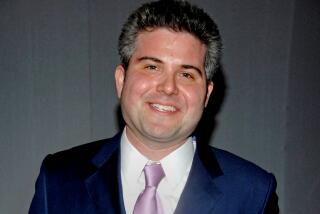BOOK REVIEW / NONFICTION : Essays on Age Reveal a Life of Anecdotage : WITH MY TROUSERS ROLLED: Familiar Essays, <i> by Joseph Epstein</i> , W.W. Norton, $25, 320 pages
- Share via
The art of the essay is dead, or so we have been told over and over again, but every now and then a book comes along to remind us how lively an artful essay can be.
“With My Trousers Rolled” by Joseph Epstein is one of those wake-up calls. Epstein, a professor at Northwestern and editor of “American Scholar,” has collected 16 essays that embody the kind of clear thinking, good humor and lapidary prose for which the essay is the very best showcase.
Many of the musings collected here seem to focus on the commonplaces of life--cars, pets, puns, sports, haircuts and so on. But the title of the book, with its allusion to T.S. Eliot’s bittersweet celebration of old age in “The Love Song of J. Alfred Prufrock,” suggests that Epstein is engaging in a kind of grand summing-up.
“By the time one reaches 40, unless one is a very great fool, one realizes that one is no longer playing with anything like a fully-loaded shot clock, to take a trope from the National Basketball Association,” he writes in an essay titled “Time on My Hands, Me in My Arms. “By 50 . . . , it is better to assume that one is already playing in overtime.”
Still, Epstein indulges in the luxury of leisurely thinking and writing, and he allows himself the space and time to tell a tale, to crack a joke, to wonder out loud, almost always in surprising and winning ways.
Epstein, for example, is capable of invoking Vladimir Nabokov, Jean Anthelme Brillat-Savarin, Aristotle Onassis, Buster Keaton and Mikhail Gorbachev in a single paragraph, all without breaking a sweat. He is moved to call Gustave Flaubert “the great Hulk Hogan of modern literature.” When he uses a phrase like “God forfend,” he says it with a smile. At his moments of greatest self-parody, he pauses to observe: “I hyperbolize but I do not entirely exaggerate.”
Epstein is not a controversialist or a propagandist or a man in love with his own ideas--all of which are common defects among essayists. Rather, he comes across as sensible and decent, civilized but not fussy, witty but never cruel, exactly the kind of guy you’d be lucky to find sitting next to you at a dinner party.
His essays are decorated with little fragments of reminiscence and memoir that tend to fill in the face behind the voice. Epstein tells us, for example, that he once held season tickets for both the Chicago Bulls and the Chicago Fine Arts Quartet, a fact that confirms our impression that Epstein is a man given to eclectic fits.
“Army, marriage, children, living in three different cities, having six different jobs, on fire with ambition, it all flew by, allegro agitato ,” he writes in “The Ignorant Man’s Guide to Serious Music.”
“I recall, out of the blur of this time, standing up at my desk in the office of a small New York magazine, about to edit the prose sadly convoluted by a stroke late in life, of Reinhold Niebuhr, and singing, ‘C’mon, Reiny, let’s do the twist.’ ”
Even when Epstein purports to confess his own flaws and failings, as in “A Bonfire of My Vanities,” he cannot help but endear himself to us. He confesses to the sin of vanity: “When my shoes are not shined, I feel, if not mildly depressed, at least a schlepper.”
But he feels guilty, too, about spending $70 to buy a Charvet bow-tie: “Seventy bones to show a bit of color at my throat is, I realize, ridiculous,” he writes. “I am not a rich man--only a vain one.”
Epstein ponders the approaching millennium in an essay titled “Decline & Blumenthal,” and he finds plenty to fret about. But he insists on taking the long view--”We have probably been on a fairly steady decline since the fifth century B.C.”--and declares that “those who love life are under the obligation not to desert it.”
“Although I look gloomy, by nature . . . I am not,” he insists. “I’m not a Wagner, Mahler, Hieronymus Bosch, Nietzsche man; I’m a Mozart, Ravel, Matisse, William James man.”
If Epstein is donning the garments of an old man in “With My Trousers Rolled,” the garb hangs well on him: “I am moderately confident that I am not yet in my dotage,” Epstein quips, “though for decades now I have been in what might be called my anecdotage.”
For which the readers of “With My Trousers Rolled” ought to be grateful.
More to Read
Sign up for our Book Club newsletter
Get the latest news, events and more from the Los Angeles Times Book Club, and help us get L.A. reading and talking.
You may occasionally receive promotional content from the Los Angeles Times.









